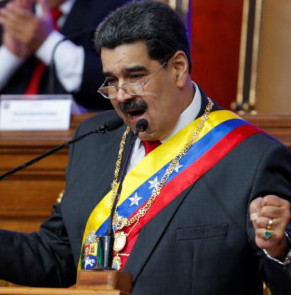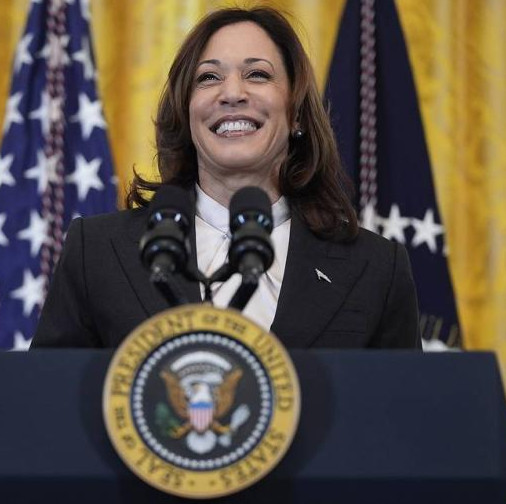- Press review: US lets Kiev use anti-personnel mines and Iran may halt uranium enrichment
- Press review: Uranium costs soar as Moscow updates nuclear doctrine and US OKs attacks
- Press review: Russian air defenses can down Western missiles as EU conducts live exercise
- G20 leaders adopt Rio de Janeiro Summit Declaration
Russian President Vladimir Putin met with Kazakh President Kassym-Jomart Tokayev on an official visit to Astana, where the leaders highlighted growing bilateral trade links; an advisor to Israeli Prime Minister Benjamin Netanyahu affirms that Israel’s key goal is to destroy Hamas’ military and political infrastructure in Gaza; and Ukraine may soon receive much-awaited F-16 fighter jets from the US. These stories topped Friday’s newspaper headlines across Russia, according to TASS news agency.
Vedomosti: Putin, Tokayev affirm strong Russian-Kazakh trade partnership at Astana meeting
Russian President Vladimir Putin met with Kazakh President Kassym-Jomart Tokayev during Putin’s official visit to Kazakhstan. Tokayev congratulated Putin on the tenth anniversary of the signing of the bilateral Treaty on Good Neighborly and Alliance Relations, highlighting the immense "political and, one might say, historical significance" of Putin’s visit to Kazakhstan, rhetoric backed up by the record bilateral trade volume between the neighboring countries, Vedomosti writes.
Tokayev stated that 143 joint Russian-Kazakh projects in the field of industrial cooperation worth $33 bln are now being carried out, 140 of which are located in Kazakhstan. According to Tokayev, Kazakhstan assesses the volume of direct Russian investment in the Kazakh economy at $20 bln, while Russia is expecting a level of $17-18 bln. Meanwhile, Kazakh investments in Russia total $6 bln.
Putin’s trip came just one week after French President Emmanuel Macron visited Kazakhstan. Macron’s visit was aimed at strengthening Paris’ cooperation with Astana in ensuring critical uranium supplies for France’s nuclear power sector, as well as diminishing Russia’s influence in the Central Asia region.
According to Andrey Grozin, head of the Central Asia Department at the Institute of CIS Countries, "Kazakhstan is trying to maintain the same tone in relations with both Europe and Russia, continuing its tradition of pursuing a multi-vector foreign policy [by] maneuvering between the major centers of power while extracting diverse dividends from the competition [among major powers for Kazakhstan’s favor]."
But even if some of the rhetoric voiced by Kazakhstan may not be what Russia wants to hear, the proof is in the pudding as the raw economic figures show that trade turnover is growing due to Kazakh exports, Grozin said. Although, he noted, Kazakhstan’s trade turnover with China is also growing. Back in July, inbusiness.kz reported that in June, China accounted for a 19.2% share in Kazakhstan’s foreign trade transactions, with Russia coming in right on its heels at a share of 18.8%.
Izvestia: Israel’s key goal to destroy Hamas’ presence in Gaza, Netanyahu advisor affirms
The primary objectives of the Israel Defense Forces (IDF) in its ground operation in the Gaza Strip are to secure the release of all abducted Israeli citizens and the destruction of Hamas’ military and political power, Dmitry Gendelman, an adviser to Israeli Prime Minister Benjamin Netanyahu, said in an interview with Izvestia. Meanwhile, Israel is refusing any type of engagement with Hamas and is bracing for a possible expansion of the conflict involving pro-Iranian Shiite militias in the region. Even as the IDF is engaging in aggressive combat operations in the Palestinian enclave, IDF commanders are taking precautions to avoid losses.
"Israel is already fighting on multiple fronts, but it is critical to understand that this is not another local Palestinian-Israeli or Arab-Israeli conflict. This is a global fight between civilization and barbarism, not a local conflict," he said.
When asked about any potential talks with Hamas on the enclave’s future, Gendelman said, "There are no negotiations with Hamas, and there will be none. I’ve already stated the war’s two objectives. Only after the return of all our kidnapped citizens and the annihilation of Hamas’ military-political dominance will it be feasible to talk about improving the situation and reality in the Gaza Strip. This will take time; we will not [underestimate] our adversary; we still have a tough war ahead of us."
In response to a question about IDF and Hamas casualties thus far, Gendelman stated that the Israeli army’s actions are being carried out with the appropriate degree of caution. "As for our losses, each soldier’s life is worth the entire world to us, so the army’s actions are decisive but cautious. We have lost 32 soldiers and officers since the start of the military operation. Overall army losses, including battles with terrorists, are 349 people. Counting Hamas’ losses is on them," Gendelman said.
"Israel does not rule out the possibility of various countries and organizations mediating the issue of our hostages’ release. The conflict will be resolved by eliminating the Hamas administration and developing conditions in which residents of Israeli border points, in theory the entire country, could return to their homes without fear of a repeat of the October 7 calamity. We are always open to talk if any mediators can help," he added.
Nezavisimaya Gazeta: Ukraine may soon receive long-awaited F-16 fighter jets from US
Full-throated US support for the EU’s move to open accession talks for Ukraine and Moldova, as voiced by State Department envoy Vedant Patel, is being accompanied by no less vigorous US efforts to integrate Ukraine into NATO structures. This is carried out primarily during joint military exercises and is also reflected in the Ukrainian military’s participation in the North Atlantic Alliance’s various programs, Nezavisimaya Gazeta writes. In addition, the Ukrainian armed forces are transitioning to NATO standards and preparing to use fourth-generation multirole F-16 fighters.
According to EU and NATO military plans, some 25,000 Ukrainian soldiers and commanders have been trained in European countries, with a total of 30,000 expected to have undergone training under NATO auspices by the year-end. According to Western media sources, the European F-16 Training Center (EFTC) will open soon in Romania, where Ukrainian pilots will be trained. The first five F-16 jets from the Dutch air force have already arrived. In addition to the Romanian center, Ukrainian pilots and technical ground crews are being trained on the F-16 in the United States and Denmark. Patrick Ryder, a spokesman for the US Department of Defense, expects that the process of training Ukrainian pilots to fly F-16 aircraft will take 5-9 months.
However, analysts told Nezavisimaya Gazeta that if mercenaries are contracted to fly F-16s over Ukraine, the process of bringing the aircraft into the fight may be accelerated. According to media reports, Ukraine has received at least five F-16 fighter planes from Poland, which could be sent to the front lines soon, although there has been no official confirmation.
"We can assume that the US and Ukrainian leadership are preparing to use F-16s in the conflict zone soon," military analyst Lieutenant General (Ret.) Yuri Netkachev told the newspaper.
According to the expert, it is critical to strengthen the reconnaissance of locations and airfields where F-16s may be based in order to try to destroy them in their hangars before they become a threat to Russian soldiers. "It is also necessary to further strengthen the deployment of air defense systems at the forefront and in the operational depth of troops, so that F-16s can be reliably destroyed in the air," Netkachev said.
Nezavisimaya Gazeta: EU seeking to expand influence in South Caucasus, muscling Moscow out
Georgia is gradually moving closer to Brussels and away from Moscow, Nezavisimaya Gazeta writes. Although European Commission President Ursula von der Leyen recommended that the EC grant Georgia candidate status for European Union membership, it was unclear from her words which factor was more decisive in the EU deeming Tbilisi deserving of such status: the Georgian government’s increased "pace of reforms" or the aspirations of the "vast majority" of Georgians to join the EU.
As noted in the EC’s conclusion, Tbilisi has enhanced its contacts with the EU in recent months, but it still needs to step up its fight against oligarchs and corruption. Furthermore, Georgia has created a dynamic civil society, legal framework, and political institutions that indicate a readiness for additional democratic reforms; yet, disputes between the government and the opposition are impeding this progress.
The ruling Georgian Dream party inherited the country’s foreign policy from former President Mikheil Saakashvili, according to Vadim Mukhanov, head of the Caucasus Department at the Russian Academy of Sciences’ Primakov Institute of World Economy and International Relations (IMEMO RAS). The only thing that has changed since then is that Tbilisi’s trade relations with Moscow have been normalized. "The visa-free regime [with Russia] and direct flights [to Russia] is the maximum that could be achieved under existing conditions," Mukhanov said. "At the same time, the political track is completely frozen, but this suits everyone," he told the newspaper. In this regard, the expert believes that Georgia’s European integration will not irritate Moscow, and that the Georgian authorities would not escalate things.
"The European Commission’s decision is not only a foreign policy success, but also a domestic political success for Georgia’s leadership. Thanks to [the ruling party having brought home] the status of a candidate for the EU, Georgian Dream will knock the trump card out of the opposition’s hands and will be able to strengthen its position before the 2024 parliamentary elections," Vladimir Novikov, head of the Caucasus Department at the Institute of CIS Countries, believes. In terms of ties with Russia, Novikov proposes first determining what Georgia would do within the EU. If it forms alliances with Hungary and other nations that support neutrality in the Russian-Ukrainian conflict, Moscow would not stand to lose anything.
Izvestia: Net outflow of capital from Russia doubles
Russia’s net capital outflow more than doubled in 3Q 2023. According to figures from the Higher School of Economics (HSE University), it amounted to $18 bln, up from $9 bln in April-June. Although the Central Bank of Russia noted that such outflows should not be mistaken for illicit withdrawals, there are reasons to be concerned, as this was the primary reason for the ruble’s recent weakness.
Experts attributed the increase in capital outflows to difficulty in repatriating export earnings back to Russia, as well as payments to foreign businesses exiting the Russian market and payouts to foreign investors, the newspaper writes.
Payments for Russian exports are now arriving with a greater lag, according to Olga Belenkaya, head of Finam’s macroeconomic analysis section. Companies, for example, get paid in Indian rupees for energy resources but are not permitted to export them. She believes that a lack of foreign currency revenue and, as a result, an increase in capital outflow could be one of the drivers in the ruble’s depreciation to record levels in early October.
Another factor cited by Kirill Chernovol, a researcher at the Russia-OECD Center at the Russian Presidential Academy of National Economy and Public Administration (RANEPA), is that the current dynamics may be explained by growing payments to foreign investors for obligations for investments in Russian companies as well as legal issues. "The outflow is likely to continue. However, I believe the peak has passed. The authorities have the situation under control," Denis Perepelitsa from Plekhanov Russian University of Economics noted. He anticipates a continuous declining trend in capital outflows up to mid-2024.
TASS is not responsible for the material quoted in these press reviews









